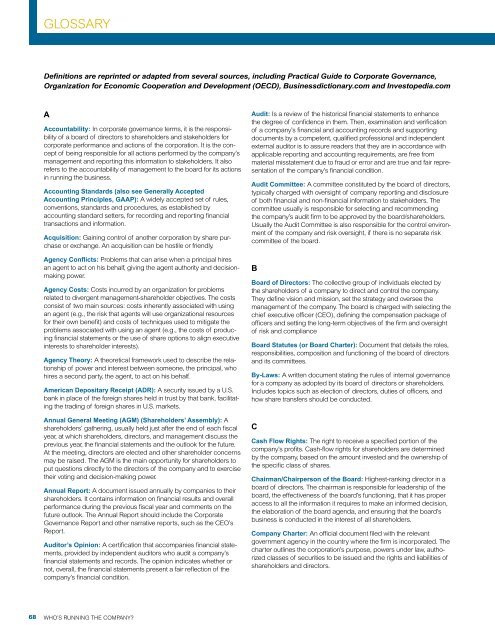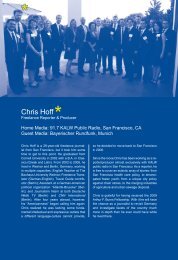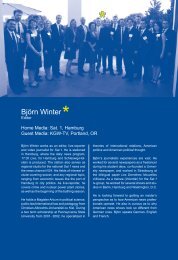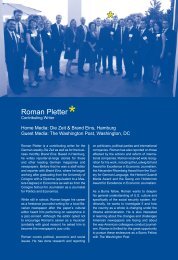Who's Running the Company? - International Center for Journalists
Who's Running the Company? - International Center for Journalists
Who's Running the Company? - International Center for Journalists
You also want an ePaper? Increase the reach of your titles
YUMPU automatically turns print PDFs into web optimized ePapers that Google loves.
GLOSSARY<br />
Definitions are reprinted or adapted from several sources, including Practical Guide to Corporate Governance,<br />
Organization <strong>for</strong> Economic Cooperation and Development (OECD), Businessdictionary.com and Investopedia.com<br />
A<br />
Accountability: In corporate governance terms, it is <strong>the</strong> responsibility<br />
of a board of directors to shareholders and stakeholders <strong>for</strong><br />
corporate per<strong>for</strong>mance and actions of <strong>the</strong> corporation. It is <strong>the</strong> concept<br />
of being responsible <strong>for</strong> all actions per<strong>for</strong>med by <strong>the</strong> company’s<br />
management and reporting this in<strong>for</strong>mation to stakeholders. It also<br />
refers to <strong>the</strong> accountability of management to <strong>the</strong> board <strong>for</strong> its actions<br />
in running <strong>the</strong> business.<br />
Accounting Standards (also see Generally Accepted<br />
Accounting Principles, GAAP): A widely accepted set of rules,<br />
conventions, standards and procedures, as established by<br />
accounting standard setters, <strong>for</strong> recording and reporting financial<br />
transactions and in<strong>for</strong>mation.<br />
Acquisition: Gaining control of ano<strong>the</strong>r corporation by share purchase<br />
or exchange. An acquisition can be hostile or friendly.<br />
Agency Conflicts: Problems that can arise when a principal hires<br />
an agent to act on his behalf, giving <strong>the</strong> agent authority and decisionmaking<br />
power.<br />
Agency Costs: Costs incurred by an organization <strong>for</strong> problems<br />
related to divergent management-shareholder objectives. The costs<br />
consist of two main sources: costs inherently associated with using<br />
an agent (e.g., <strong>the</strong> risk that agents will use organizational resources<br />
<strong>for</strong> <strong>the</strong>ir own benefit) and costs of techniques used to mitigate <strong>the</strong><br />
problems associated with using an agent (e.g., <strong>the</strong> costs of producing<br />
financial statements or <strong>the</strong> use of share options to align executive<br />
interests to shareholder interests).<br />
Agency Theory: A <strong>the</strong>oretical framework used to describe <strong>the</strong> relationship<br />
of power and interest between someone, <strong>the</strong> principal, who<br />
hires a second party, <strong>the</strong> agent, to act on his behalf.<br />
American Depositary Receipt (ADR): A security issued by a U.S.<br />
bank in place of <strong>the</strong> <strong>for</strong>eign shares held in trust by that bank, facilitating<br />
<strong>the</strong> trading of <strong>for</strong>eign shares in U.S. markets.<br />
Annual General Meeting (AGM) (Shareholders’ Assembly): A<br />
shareholders’ ga<strong>the</strong>ring, usually held just after <strong>the</strong> end of each fiscal<br />
year, at which shareholders, directors, and management discuss <strong>the</strong><br />
previous year, <strong>the</strong> financial statements and <strong>the</strong> outlook <strong>for</strong> <strong>the</strong> future.<br />
At <strong>the</strong> meeting, directors are elected and o<strong>the</strong>r shareholder concerns<br />
may be raised. The AGM is <strong>the</strong> main opportunity <strong>for</strong> shareholders to<br />
put questions directly to <strong>the</strong> directors of <strong>the</strong> company and to exercise<br />
<strong>the</strong>ir voting and decision-making power.<br />
Annual Report: A document issued annually by companies to <strong>the</strong>ir<br />
shareholders. It contains in<strong>for</strong>mation on financial results and overall<br />
per<strong>for</strong>mance during <strong>the</strong> previous fiscal year and comments on <strong>the</strong><br />
future outlook. The Annual Report should include <strong>the</strong> Corporate<br />
Governance Report and o<strong>the</strong>r narrative reports, such as <strong>the</strong> CEO’s<br />
Report.<br />
Auditor’s Opinion: A certification that accompanies financial statements,<br />
provided by independent auditors who audit a company’s<br />
financial statements and records. The opinion indicates whe<strong>the</strong>r or<br />
not, overall, <strong>the</strong> financial statements present a fair reflection of <strong>the</strong><br />
company’s financial condition.<br />
Audit: Is a review of <strong>the</strong> historical financial statements to enhance<br />
<strong>the</strong> degree of confidence in <strong>the</strong>m. Then, examination and verification<br />
of a company’s financial and accounting records and supporting<br />
documents by a competent, qualified professional and independent<br />
external auditor is to assure readers that <strong>the</strong>y are in accordance with<br />
applicable reporting and accounting requirements, are free from<br />
material misstatement due to fraud or error and are true and fair representation<br />
of <strong>the</strong> company’s financial condition.<br />
Audit Committee: A committee constituted by <strong>the</strong> board of directors,<br />
typically charged with oversight of company reporting and disclosure<br />
of both financial and non-financial in<strong>for</strong>mation to stakeholders. The<br />
committee usually is responsible <strong>for</strong> selecting and recommending<br />
<strong>the</strong> company’s audit firm to be approved by <strong>the</strong> board/shareholders.<br />
Usually <strong>the</strong> Audit Committee is also responsible <strong>for</strong> <strong>the</strong> control environment<br />
of <strong>the</strong> company and risk oversight, if <strong>the</strong>re is no separate risk<br />
committee of <strong>the</strong> board.<br />
B<br />
Board of Directors: The collective group of individuals elected by<br />
<strong>the</strong> shareholders of a company to direct and control <strong>the</strong> company.<br />
They define vision and mission, set <strong>the</strong> strategy and oversee <strong>the</strong><br />
management of <strong>the</strong> company. The board is charged with selecting <strong>the</strong><br />
chief executive officer (CEO), defining <strong>the</strong> compensation package of<br />
officers and setting <strong>the</strong> long-term objectives of <strong>the</strong> firm and oversight<br />
of risk and compliance<br />
Board Statutes (or Board Charter): Document that details <strong>the</strong> roles,<br />
responsibilities, composition and functioning of <strong>the</strong> board of directors<br />
and its committees.<br />
By-Laws: A written document stating <strong>the</strong> rules of internal governance<br />
<strong>for</strong> a company as adopted by its board of directors or shareholders.<br />
Includes topics such as election of directors, duties of officers, and<br />
how share transfers should be conducted.<br />
C<br />
Cash Flow Rights: The right to receive a specified portion of <strong>the</strong><br />
company’s profits. Cash-flow rights <strong>for</strong> shareholders are determined<br />
by <strong>the</strong> company, based on <strong>the</strong> amount invested and <strong>the</strong> ownership of<br />
<strong>the</strong> specific class of shares.<br />
Chairman/Chairperson of <strong>the</strong> Board: Highest-ranking director in a<br />
board of directors. The chairman is responsible <strong>for</strong> leadership of <strong>the</strong><br />
board, <strong>the</strong> effectiveness of <strong>the</strong> board’s functioning, that it has proper<br />
access to all <strong>the</strong> in<strong>for</strong>mation it requires to make an in<strong>for</strong>med decision,<br />
<strong>the</strong> elaboration of <strong>the</strong> board agenda, and ensuring that <strong>the</strong> board’s<br />
business is conducted in <strong>the</strong> interest of all shareholders.<br />
<strong>Company</strong> Charter: An official document filed with <strong>the</strong> relevant<br />
government agency in <strong>the</strong> country where <strong>the</strong> firm is incorporated. The<br />
charter outlines <strong>the</strong> corporation’s purpose, powers under law, authorized<br />
classes of securities to be issued and <strong>the</strong> rights and liabilities of<br />
shareholders and directors.<br />
68<br />
WHO’S RUNNING THE COMPANY?
















